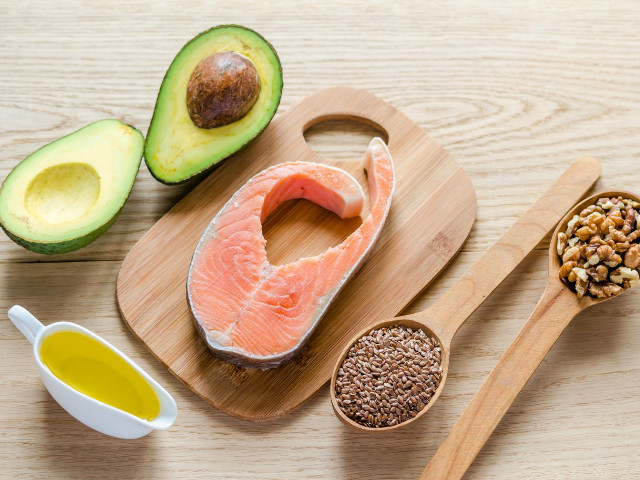
Our Janus-faced treatment of this golden element of nutrition prevents us from harnessing its true potential and we fail to strike a balance in its consumption. But they are not the villains you presume them to be. Rather, moderate consumption of organic fats is essential for wellness and optimal health.
Get your fats straight
Saturated fats have no double bonds. They are more solid at room temperature and come from animal sources such as red meat, dairy and tropical oils, including palm and coconut oils.
 PHOTO: AUTHORITYNUTRITION
PHOTO: AUTHORITYNUTRITIONUnsaturated fats have more double bonds, and depending on the number of bonds are classed into different groups: Mono-saturated fatty acids (one double bond) or MUFAs and poly saturated fatty acids (more than one double bonds) or PUFAs. Moreover, unsaturated fatty acids are usually liquid at room temperature and are derived from sea food, vegetable and plant based oils.
Good fats, bad facts?
Unsaturated fats are generally deemed as good fats. MUFAs, PUFAs, Omega-3 and Omega-6 are all source of good cholesterol. In fact, Omega-3, also dubbed as the ‘essential fatty acid’, is responsible for proper development of vision and strengthening of the immune system and is found in sea food. On the other hand, Omega-6 is responsible for promoting cell growth and initiates cell repair following an inflammation cascade.
Generally, fats are responsible for development of a protective sheath around organs. They also help with brain development which is made of 60% fats, fuelling our daily activities, storing readily available energy, increasing good cholesterol (HDL) and increasing absorption of oil soluble vitamins A, K, E and D. Things, however, tend to get sketchy where saturated fats are concerned.
 PHOTO: MENSHEALTH
PHOTO: MENSHEALTHInitially attributed to increasing the risk for CVD, saturated fats have just begun to emerge in a new avatar. Meta-analysis of 72 different trials and studies seems to annul this infamous association between heart diseases and saturated fats.
Scrutiny of scientific data accrued over decades shows that saturated fats and mono-saturated fats have neither good nor bad impact on heart stability.
7 signs you’re not eating enough healthy fats
Even population studies showing virtually non-existent heart diseases in Eskimo tribe of Antarctica and Massai tribe of Kenya, despite surviving on fat rich diet of whale meat, milk, blubber and animal blood, are a testimonial of the nutritional value of saturated fats.
For diet to decrease the risk of CVD, moderation is more important than exclusion. Replacing saturated fats with carbohydrates does the heart no good. Furthermore, healthfulness of food cannot be judged on numbers of grams but on the way the food is processed, which is why one should steer clear of Trans fats, unsaturated fats that have been artificially treated with hydrogen to increase their shelf life and are definitely related to heart troubles.
Don’t skip breakfast if you want to remain active
However, this notion has not yet received widespread credence and opponents cry bias as there are many limitations of such meta-analysis, self-reporting of intake by participants, population difference, and variability of benchmarks and study parameter, to name a few. This is why leading health authorities such as the American Heart Association, have refused to revise their dietary guidelines, recommending diet of fruits and saturated fats, despite contrary evidence.
 PHOTO: HUFFINGTONPOST
PHOTO: HUFFINGTONPOSTBust the fat myths
Eating fats makes you fat
Unless you are binging on fatty food and being a couch potato, moderate consumption of fats does no harm. The body stores excess calories as fat, which can also easily be derived from proteins and carbohydrates.
Fats are not a source of energy
During the resting period when you do not engage in strenuous activities, fats are body’s choice of fuel. The body only burns carbohydrates when it enters a high activity mode, such as workouts.
2 biggest lies you've been told about fat
Avoiding all fatty food is good for health
Wrong. The bad reputation precedes the good fats rendering the body. You need good quantity of fats to maintain your optimum wellness. This is derived from a combination of fruits, nuts, oils, dairy and meat. Consuming low-fat processed food is far worse than consuming organic-fat rich diet.


1727778647-0/diddy-(16)1727778647-0-165x106.webp)

1732014631-0/BeFunky-collage-(71)1732014631-0-165x106.webp)

1732004244-0/Untitled-design-(13)1732004244-0-270x192.webp)
1732002444-0/Express-Tribune-(4)1732002444-0-270x192.webp)









COMMENTS
Comments are moderated and generally will be posted if they are on-topic and not abusive.
For more information, please see our Comments FAQ